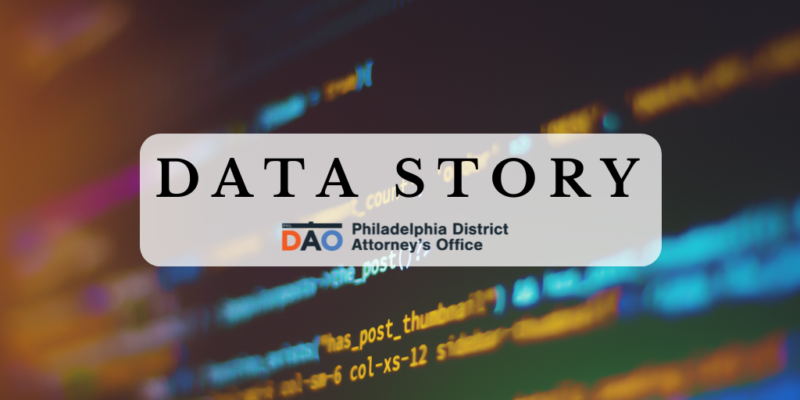
By Kelly Burkhardt (she/her), Mary Doyle (she/her), and Tyler Tran (he/him)
The Philadelphia LGBTQ+ community is struggling to find answers after the assault and death of a Black gay man at a popular gay bar, as queer, transgender, and nonbinary people are at higher risk of being victims of assault, harassment, and hate crimes than the general population: LGBTQ+ people are almost four times as likely as non-LGBTQ+ people to be victims of violent crime, and queer people are six times more likely to see violence from someone they are close to than non-LGBTQ+ people. Black and Latinx transgender women see some of the highest rates of victimization.
Despite these differences in victimization, LGBTQ+ people are less likely to report incidents to law enforcement, potentially due to distrust of police or a lack of identity-affirming services. The criminal justice system is a particularly hostile environment for LGBTQ+ people, especially transgender people of color. On top of underreporting, law enforcement agencies in the US rarely gather or publish stats on hate crimes and violence in the LGBTQ+ community. The Philadelphia District Attorney’s Office (DAO) has taken steps to create a system that offers equal access to safety and justice for all people, including by creating an automated tool to identify cases with LGBTQ+ individuals to reduce and prevent interactions and processes that compound harm.
Supporting LGBTQ+ people in the criminal legal system
At the Philadelphia DAO, LGBTQ+ liaison Kelly Burkhardt and other victim/witness coordinators provide specialized services to queer victims, witnesses, and defendants. These services include connecting people to LGBTQ+-specific community organizations like William Way LGBT Community Center, Attic Youth Center, GALAEI, and Mazzoni Center, connecting people to trauma-informed care, peer counseling, HIV and STI testing, and aiding with food insecurity and housing issues.
In the majority of incidents (61%) where DAO staff has provided LGBTQ+-specific support since 2019, both the victim and defendant were LGBTQ+ individuals. About a third of incidents involved only LGBTQ+ victims, and one in 12 incidents involved only LGBTQ+ defendants. Despite conventional media portrayals of victimization being perpetrated by strangers, violence between partners, family members, and acquaintances is far more common.
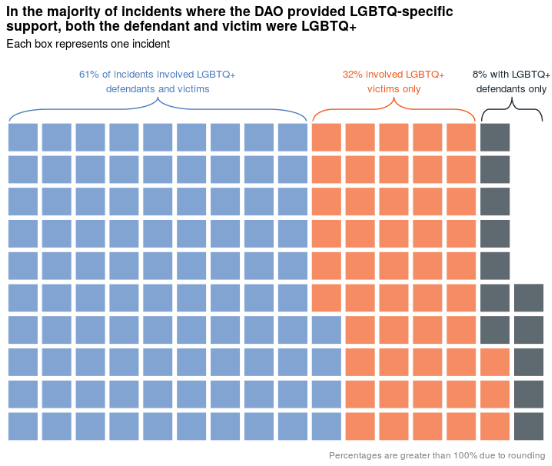
The overwhelming majority of cases where the DAO provided LGBTQ+-specific support since 2019 were for violent acts like aggravated assaults, strangulation, and shootings. These serious cases require more court appearances and more sensitivity to the compounding factors of trauma. DAO victim/witness coordinators guide people through the court process in an identity-affirming way by disclosing ourselves as LGBTQ+ community members and ensuring appropriate pronoun usage throughout the court process.
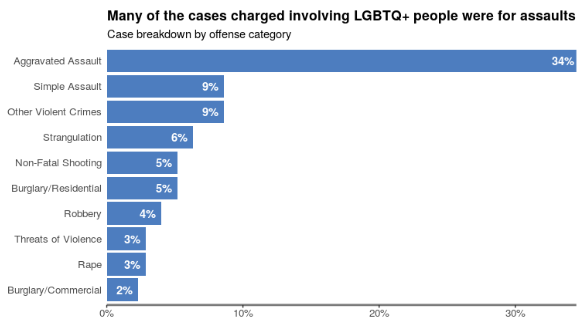
These cases represent the incidents where staff are aware that an LGBTQ+ individual is involved and we reach out within 48-72 hours after an arrest has been made. Many are incidents of intimate partner violence or domestic violence, where a person’s identity might be more relevant and apparent than in a drug case, for example. We are presently not able to classify every case involving LGBTQ+ people, but are working to improve our case identification while prioritizing support for the cases we accurately identify.
The process: Identifying incidents and providing support
To provide LGBTQ+-specific resources and services, it’s first necessary to be aware of incidents involving LGBTQ+ people. Historically, the majority of these connections come through word of mouth: relationships with community members, community organizations, attorneys, and victim/witness coordinators in the office are crucial.
In November 2020, we implemented an automated tool to identify arrests involving queer people to supplement the connections made through word of mouth and media reports. To date, the tool has alerted the LGBTQ+ liaison to more than 60 arrests for incidents involving LGBTQ+ people.
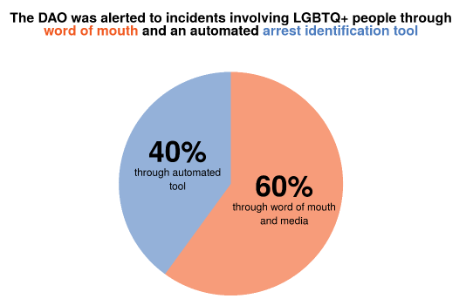
The automated tool searches arrest writeups for keywords such as “transgender,” “his boyfriend,” names of gay bars, or even slurs to help the DAO identify cases and improve service provision. In addition to reducing the number of people who might fall through the cracks, the automated tool has allowed the LGBTQ+ liaison to learn about incidents more quickly; email alerts are typically sent within 24 hours of an arrest.
Since creating the tool in 2020, a sad issue has been made clear: three of every four arrests accurately flagged by the tool involve intimate partner violence or domestic violence. LGBTQ+ people who experience intimate partner violence often face unique barriers when searching for help, and LGBTQ+-focused services can be crucial.
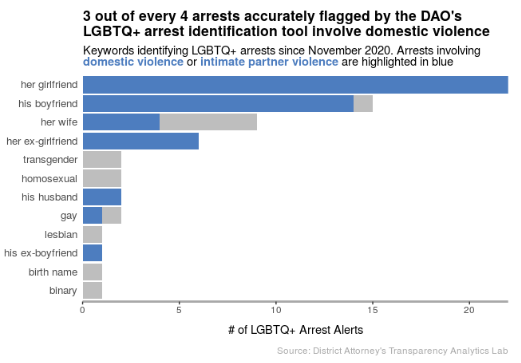
Once an arrest is made, the DAO LGBTQ+ liaison reaches out to the LGBTQ+-identifying individual, discussing their rights as a victim of a crime, safety planning, the court process, and doing a needs assessment for any potential referrals to community-based agencies. The liaison can provide accompaniment and help the victim with filing a Victim’s Compensation Assistance Program claim to assist with medical bills, counseling costs, and other needs. Due to the way LGBTQ+ folks have historically been treated within the criminal justice system, it can be helpful to have someone advocating for you who shares your identity as an LGBTQ+ person. Our aim is to provide gender and identity-affirming support throughout the person’s interaction with the criminal justice system.
Looking forward
The actions taken by the DAO thus far are a starting point in addressing violence and victimization in the LGBTQ+ community. In the future, resources are needed to prevent these incidents before they even happen and to provide support and care if they do. The DAO is working with an LGBTQ+ Community Advisory Committee to gather input and feedback on our work going forward. We hope that LGBTQ+-specific issues and care can become a priority of government agencies to better serve these marginalized populations.